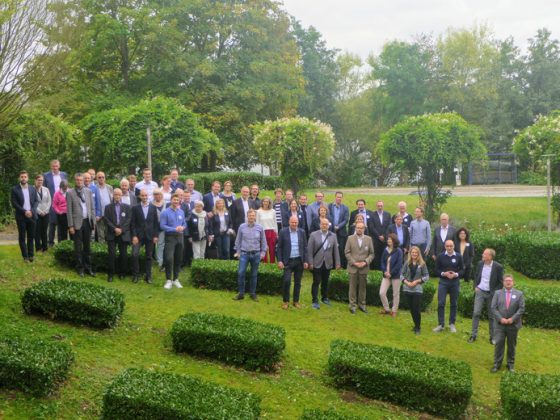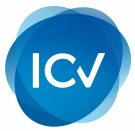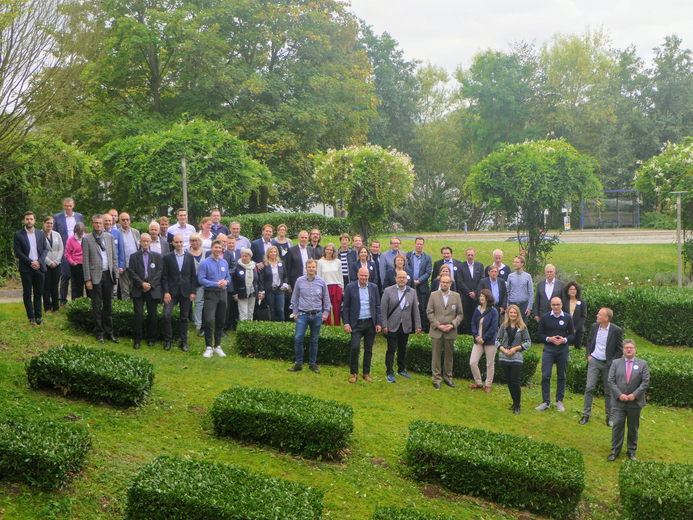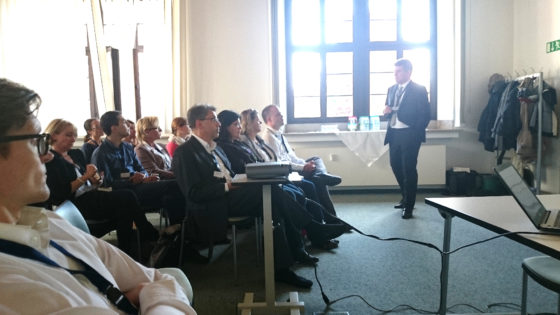
Aus der traditionellen ICV Nordtagung wurde in diesem Jahr die ICV Nord-Ost-Tagung. Die Arbeitskreise aus der Region Nord veranstalteten sie diesmal gemeinsam mit den Arbeitskreisen der Region Ost am 17. und 18. September 2021 in Schwerin. Dort wurde auch der ICV Newcomer Award verliehen (wir haben berichtet).
Unsichere Zukunft erschwert Prognosen
In der Begrüßung betonten Matthias Wolfskeil, ICV Delegierter für Deutschland Region Nord, und Dieter Meyer, Delegierter für die Region Ost, dass ein unsicheres Zukunftsgeschäft Prognosen erschwere und erhöhte Anforderungen im Sinne von häufigeren Kursänderungen stelle. Der Transformationsprozess verlange von den Controllern, erfolgreich Orientierung zu geben und Kurs zu halten. Das sei allerdings nicht immer einfach: „Niemand hätte jemals den Ozean überquert, wenn er die Möglichkeit gehabt hätte, bei Sturm das Schiff zu verlassen”, so Wolfskeil.
Wie wirtschaftlich sind automatisierte administrative Prozesse?
Im ersten Hauptvortrag berichtete Prof. Dr. Crönertz, HTWK Leipzig, über die „Wirtschaftlichkeitsanalyse automatisierter administrativer Prozesse“ in der sogenannten Hidden Factory. Ausgangspunkt der Entwicklung sind herkömmliche ERP-Systeme über die Robotic Prozess Automation (RPA) bis hin zum Einsatz Künstlicher Intelligenz (KI). Bei der RPA werden PDF-Inhalte ausgelesen und in weitere Auswertungen übertragen; in der KI werden Bedarfe auf der Basis von Mustern und Algorithmen ermittelt. Crönertz konzentrierte sich auf die RPA, deren Vorstufe ein entsprechendes Workflow-Management ist. Hierbei ist ein Workflow ein formal beschriebener, ganz oder teilweise automatisierter Geschäftsprozess. Die RPA ahmt menschliche Routine-Arbeiten software-gestützt nach (Einsatz sog. Software-Roboter), beispielsweise die Rechnungserstellung: Daten werden in vorgegebene Rechnungspositionen eingefügt. Mehrwerte der RPA können in Schnelligkeit, Skalierbarkeit, Genauigkeit (Fehlervermeidung), Dokumentationserleichterungen, Mitarbeiterzufriedenheit, Insourcing-Potentialerweiterungen und verbesserter Wirtschaftlichkeit verortet werden.
Freiräume erlauben qualifizierte Analysen
Einsparpotenziale verdeutlichte der Referent anhand eines Beschaffungsbeispiels hinsichtlich Zeitbedarf, Lieferantenauswahl, Kosten im Einkaufsprozess. Besonders wichtig ist laut Crönertz, dass im Controlling damit Freiräume für qualifiziertere Analysen entstehen. Vorgestellt wurde ein Praxisfall zur digitalen Transformation von Finanzprozessen im Bereich Customer Finance der Telekom Deutschland GmbH. Durchgeführt wurde dort eine Nutzwertanalyse. Anwendungsfelder sind insbesondere Inkasso, Fakturaprüfung, Paycards, Rechnungscheck, Finance-Reports. Zu warnen sei aber vor dem Betreuungsaufwand automatisierter Prozesse und der teilweise weiterhin zu beobachtenden Skepsis seitens vieler Mitarbeiter.
Ertragscontrolling 4.0 am Beispiel der Berliner Verkehrsbetriebe
Am Beispiel des in Corona-Zeiten besonders geforderten ÖPNV beschrieben Prof. Dr. Robert Knappe, Jonas Krembsler und Sandra Spiegelberg vom Forschungs-Team ReComMeND das „Ertragscontrolling 4.0 mithilfe von Predictive Analytics (PA)“. Analysiert wurde die BVG. Das Berliner Verkehrsunternehmen hat eine Controllingabteilung mit etwa 20 Mitarbeitern. Basis ist eine monatsbasiert rollierende Prognose, die im Verkehrsverbund VBB auch davon abhängt, wie die Verbundpartner (S-Bahnen, DB Regio) agieren. Kundeninformationen liegen nur begrenzt vor. Einnahmen und Rechnungsabgrenzungen ergeben die Fahrgelderträge. Ziele des vorgestellten Projekts sind vor allem die Optimierung der Prognosemethodik und ein besseres Verständnis der Treibereinflüsse.
Sehr komplexe Ticketstrukturen (Touristentickets, Semestertickets, 300 Fahrscheinvarianten) erschweren den PA-Einsatz. Treiber sind nicht nur Arbeitsmarkt- und Tourismuszahlen und die Bevölkerungsentwicklung, sondern beispielsweise auch Wettereinflüsse, Staumessungen etc. Für das Wetter wurde hilfsweise die Variable “Tage mit Niederschlag im Monat” gebildet. Schwierig sei auch die Erfassung der Pendlerzahlen, insbesondere in Corona-Zeiten.
Die Referentin Spiegelberg stellte das autoregressive SARIMA-Modell zur Ermittlung der BVG-Gesamterträge vor, differenziert nach Abos und Einzeltickets. Corona-Einflüsse in 2020 mussten gesondert berücksichtigt werden, da insoweit keine Lerneffekte aus Vergangenheitsdaten abgeleitet wurden. Bei der rollierenden Prognose war nur nach und nach eine Adaption möglich. Als identifizierte Spannungsfelder präsentierte Knappe ein Auseinanderdriften von
- Erklärbarkeit und Transparenz vs. Komplexität der Methoden
- Wirtschaftlichkeit der Methoden vs. hohe Investitionskosten
- Hoher Automatisierungsgrad vs. Pflege durch Data Scietists
- Zuverlässige Performance vs. Unsicherheiten bei Schocks
Mögliche Antworten liegen
- in Plausibilisierung, Erfahrung, Kulturwandel
- in Synergieeffekten durch eine Digitalisierungsstrategie
- im Strukturwandel bei Personalqualifikationen und Change Projekten sowie
- im Nachlernen des Systems unter Ausräumung möglicher Hindernisse (Grenzen der Methodik, Datenquantität und -qualität, Wandel des Bewusstseins).
Schocks wie Corona seien aber letztlich nicht einzufangen.
Zum Abschluss fassten die Referenten ihre Einschätzungen in 4 Thesen zur PA-Implementierung und Controllingpraxis wie folgt zusammen:
- Je reifer der Digitalisierungsgrad des Unternehmens, desto qualitativ besser und wirtschaftlicher wird der Einsatz von KI-Technologien wie z.B. PA gelingen. Das strategische Management des Wandels hin zu einem datengetriebenen Unternehmen ist somit von großer Bedeutung für den nachhaltigen Implementierungserfolg von KI und PA.
- Das Controlling gibt einen Teil seiner Aufgaben und Kompetenzen an andere Akteure und Technologien ab, insbesondere in den Bereichen Informationsversorgung und Rationalitätssicherung.
- Es findet ein langfristiger und nachhaltiger Change-Prozess statt, der nicht nur die Aufbau- und Ablauforganisation, sondern auch die Management- und Controllingkultur verändert.
- Schnelle und kurzsichtige PA-“Insellösungen“ sind wenig erfolgversprechend.
Gute Entscheidung und Führung als weitere Themen
Weitere Themen waren in Schwerin „Die gute Entscheidung als Ziel …“ (Philipp Wicke, TD Trusted Decision, Hannover) sowie „Führen mit Herz und Verstand“ (Lothar Kuhls, WEGe Managementberatung GmbH, Hamburg).
Die Kriterien bei der Entscheidungsauswahl folgen gemäß Wicke der Devise: Angewandtes Wissen ist Macht. Er differenzierte zwischen Entscheidungen mit und ohne Zeitdruck. Kognitive Entscheidungen und intuitive Entscheidungen stehen in einem Sowohl-als-auch-Zusammenhang. Insbesondere bei unbekannten Risiken (VUCA) bedürfen gute Entscheidungen der Intuition und der Anwendung von Heuristiken. Intuition ist gefühltes Wissen, das stark genug ist, um danach zu handeln (ohne genau zu wissen warum). Das Emotionssystem ist nach Wicke schneller als das rationale. In Einklang gebracht entsteht ein kohärentes Weltbild. Kognitive Verzerrungen schränken die Entscheidungsgüte intuitiver Entscheidungen ein, z.B. die Verlustaversion. Controller haben hier u.a. die Aufgabe, diese kognitiven Verzerrungen zu messen.
Der Referent Kuhls regte insbesondere an, in einem Führungskreislauf das Delegieren zu strukturieren und Feedbackregeln zu nutzen. Machtelemente sollten ausgewogen gelebt werden. U.a. sind hier Standfestigkeit, Leidenschaft und Selbstkontrolle von großer Bedeutung. Sein Schlussappell: Mit Mut agieren.
Wir bedanken uns für diesen Tagungsbericht bei Dr. Hans-Jürgen Hillmer, BuS-Netzwerk Betriebswirtschaft und Steuern, Coesfeld!
 The traditional ICV North Conference became the ICV North-East Conference this year. This time, the Work Groups from the Germany North Region organized it together with the Work Groups from the Germany East Region on September 17 and 18, 2021 in Schwerin. The ICV Newcomer Award was also presented there (we reported about it).
The traditional ICV North Conference became the ICV North-East Conference this year. This time, the Work Groups from the Germany North Region organized it together with the Work Groups from the Germany East Region on September 17 and 18, 2021 in Schwerin. The ICV Newcomer Award was also presented there (we reported about it).
Uncertain future makes forecasting difficult
In the welcome speech, Matthias Wolfskeil, ICV Delegate for Germany North Region, and Dieter Meyer, Delegate for the East Region, emphasized that an uncertain future makes forecasts more difficult and places increased demands in terms of more frequent course changes. The transformation process requires controllers to successfully provide orientation and stay on course. However, this is not always easy: “Nobody would have ever crossed the ocean if they had had the opportunity to leave the ship in a storm,” said Wolfskeil.
How economical are automated administrative processes?
In the first main lecture, Prof. Dr. Crönertz, HTWK Leipzig, reported on the “profitability analysis of automated administrative processes” in the so-called Hidden Factory. The starting point for the development are conventional ERP systems through Robotic Process Automation (RPA) to the use of Artificial Intelligence (AI). With RPA, PDF content is read out and transferred to further evaluations; In AI, needs are determined on the basis of patterns and algorithms. Crönertz concentrated on RPA, the preliminary stage of which is a corresponding workflow management. A workflow is a formally described, fully or partially automated business process. The RPA mimics routine human work with the help of software (use of so-called software robots), for example the creation of invoices: data is inserted into specified invoice items. The added value of RPA can be located in speed, scalability, accuracy (avoidance of errors), simplification of documentation, employee satisfaction, insourcing potential expansion and improved economic efficiency.
Free spaces allow qualified analyzes
The speaker used a procurement example to illustrate potential savings with regard to time requirements, supplier selection, and costs in the purchasing process. According to Crönertz, it is particularly important that there is scope for more qualified analyzes in controlling. A practical case for the digital transformation of financial processes in the customer finance department of Telekom Deutschland GmbH was presented. A benefit analysis was carried out there. Areas of application are in particular debt collection, invoice verification, pay cards, invoice checks, finance reports. A warning should be given, however, against the effort required to support automated processes and the skepticism that can still be observed on the part of many employees.
Yield controlling 4.0 using the example of the Berlin transport company
Using the example of public transport, which is particularly challenged in corona times, Prof. Dr. Robert Knappe, Jonas Krembsler and Sandra Spiegelberg from the ReComMeND research team developed “Yield Controlling 4.0 using Predictive Analytics (PA)”. The BVG was analyzed. The Berlin transport company has a controlling department with around 20 employees. The basis is a monthly rolling forecast, which in the Verkehrsverbund VBB also depends on how the association’s partners (S-Bahn, DB Regio) operate. There is only limited customer information available. Income and deferred income result in the fare income. The main goals of the project presented are the optimization of the forecasting methodology and a better understanding of the driver influences.
Very complex ticket structures (tourist tickets, semester tickets, 300 types of tickets) make PA use difficult. The drivers are not only labor market and tourism figures and population development, but also, for example, weather influences, congestion measurements, etc. For the weather, the variable “days with precipitation per month” was created as an alternative. It is also difficult to record the number of commuters, especially in corona times.
The speaker, Spiegelberg, presented the autoregressive SARIMA model for determining the total BVG income, differentiated according to subscriptions and individual tickets. Corona influences in 2020 had to be taken into account separately, as no learning effects were derived from past data. With the rolling forecast, an adaptation was only possible gradually. As identified areas of tension, Knappe presented a drifting apart of
- Explainability and transparency vs. complexity of the methods
- Profitability of the methods vs. high investment costs
- High degree of automation vs. maintenance by data scientists
- Reliable performance vs. uncertainties in the event of shocks
Possible answers lie
-
- in plausibility checks, experience, cultural chang
- in synergy effects through a digitization strateg
- in structural change in personnel qualifications and change projects as well
- in relearning the system while removing possible obstacles (limits of methodology, data quantity and quality, change in consciousness).
Ultimately, however, shocks like corona cannot be captured.
Finally, the speakers summarized their assessments in 4 theses on PA implementation and controlling practice as follows:
- The more mature the degree of digitization of the company, with the better quality and the more economical the use of AI technologies such as PA will be. The strategic management of the change towards a data-driven company is therefore of great importance for the sustainable implementation success of AI and PA.
- Controlling hands over some of its tasks and competencies to other actors and technologies, especially in the areas of information supply and rationality assurance.
- A long-term and sustainable change process takes place, which not only changes the structure and process organization, but also the management and controlling culture.
- Fast and short-sighted PA “island solutions” are not very promising.
Good decision and leadership as additional issues
Further topics in Schwerin were “The good decision as a goal…” (Philipp Wicke, TD Trusted Decision, Hanover) and “Leading with heart and mind” (Lothar Kuhls, WEGe Managementberatung GmbH, Hamburg).
According to Wicke, the criteria for making a decision follow the motto: Applied knowledge is power. He differentiated between decisions with and without time pressure. Cognitive decisions and intuitive decisions are in a as-well-as-well connection. Particularly in the case of unknown risks (VUCA), good decisions require intuition and the use of heuristics. Intuition is felt knowledge that is strong enough to act on (without knowing exactly why). According to Wicke, the emotion system is faster than the rational one. When harmonized, a coherent worldview is created. Cognitive biases limit the quality of intuitive decisions, e.g. loss aversion. One of the tasks of controllers here is to measure these cognitive distortions.
The speaker Kuhls suggested in particular that delegating should be structured in a management circle and that feedback rules should be used. Elements of power should be lived in a balanced way. Among other things, stability, passion and self-management are of great importance here. His final appeal: act with courage.
We thank Dr. Hans-Jürgen Hillmer, BuS-Netzwerk Betriebswirtschaft und Steuern, Coesfeld for this report!



